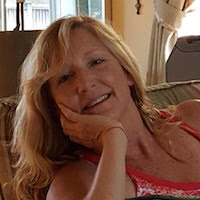My sister showed up drunk at my house the day I brought my baby daughter home from the hospital.
Tucked under her arm was a jug half full of vodka which she called “water.” She stumbled out of the car, righted herself, and set her course for the baby. “She is so cool!” she said reaching for the baby with one hand still clutching her vodka.
That day, my relationship with my sister changed. I had been taught from an early age to stand back and not cause a ruckus. Putting up with my sister’s poor behavior defined me. She was “difficult” and I was the small blond “yes” girl. She climbed onto the hand wring washer to try it out, wildly turning the crank as she balanced on one foot. I stood by and watched, keeping a furtive eye out for Mother.
She took her bike down the highest hill by our house, hair streaming behind her, laughing gleefully with a wild look in her eye. I slowly made my way down, braking every couple of feet, hoping that she would not fall and I would not get in trouble for it. My childhood was punctuated by her ability to dance wildly with the wind and hurl books at high speeds toward my head. She was later diagnosed with bi-polar disorder, a term which may have meant something to someone, but not to me.
The day my firstborn child came into the world, I had no choice.
The birth of my baby redefined what safety meant. It was no longer about standing by, covering up and being subjected to fear that she might harm herself or me in the process. That small new life was undefended in the world and she was my world. She was the tiny young parts of me that never got to stand up, never got to fight for freedom and never got to slam a door. The parts that cowered away from the embarrassment or laughed at my sister’s careening tragedies, that raised their heads and said “I count.”
That day I planted myself between her and my baby, raised myself up on my toes and said “Stop!” She stopped short and looked at me, shock registering in her eyes as she tried desperately to focus. Her gaze went to the baby and then to the jug in her hand. She sat down on my front stoop. I sat beside her.
I wish I could tell you that the conversation we had healed all wounds and made us whole. But this is life.
I did set limits. She could not be around the baby nor could she visit me any more if she had been drinking. I held my stance in the years that followed. Given her propensity for drink, sober days were few and far between. She came and went as sobriety waxed and waned until her addiction lead to her death at the age of 37.
As I look back on those years and wonder what I learned (and in turn what you can learn from my experience), I notice several things:
1. Hold Yourself Important: As I stood up and spoke up in conversations with my sister, I brought myself to the place of importance. I checked with myself to be sure that what I was saying and requesting of her honored my being.
2. Ask Questions: When she called to request time with the baby, I asked her questions. “Are you sober? Do you have a specific arrival and departure time? Do you need anything from me?” These three questions placed the burden of responsibility on her. If she was not sober, the visit was not entertained. If she could not state and commit to a time of arrival and departure, I was at her mercy and would sit for minutes or hours awaiting her rushed and oft times guilty arrival. Honoring the time commitment reduced the chance of my upset and hers. And finally if she needed something from me (money, a place to sleep) we took care of it before the visit and she was free to visit without the impending doom of a request yet to be made. Questions helped to define her requests and my limits.
3. Feel Free To Say No: As is the norm with new mothers, one morning I found myself particularly upset. The baby demanded many things of me pertaining to her very existence, consisting mainly of diapering, feeding and holding. That day, I could not determine which of those she was asking for. She was fussy. I was fussy. I could not welcome a visitor of any kind. My sister called and demanded to come by, her voice hard and insistent. I felt pushed in and cornered. I took a breath, steeled myself against the firestorm sure to be coming and spoke up with tears close to spilling and a quivering chin. “I can’t. I simply am not able to accommodate the baby’s demands and your visit.” The honesty of my response and the desperation in my voice must have hit the right note. She immediately softened and I learned that honesty and “No” would support me moving forward.
4. Humans Are Not Perfect: Did I ever let her in, knowing that she was on a manic or was not sober? Yes. Of course I did. Was it okay? Sometimes it was. Other times I was tremendously hard on myself. She would look at me sheepishly as if to say “I’m sorry.” I learned that in those moments, the ones where I was prone to beat myself up and she was desperate to hold on to the sweet balance we had made, I could relax a little, hug her and try again another time. We all do the very best we can. Knowing this gets us through.
Given her shortened life, difficulty with sobriety and early death, I could easily look back and regret limiting her short time with the niece she clearly wanted in her life. My childhood with my sister ended that day and my adulthood with her began. That day, I was introduced to parts of me that deserved the attention they got.
While I will continue to miss her, that day, I grew up a bit.
Relephant:
Knowing When to Speak Up or Shut Up.
Author: Annette Moore
Editor: Catherine Monkman
Photos: Estelle F./Flickr











Read 0 comments and reply